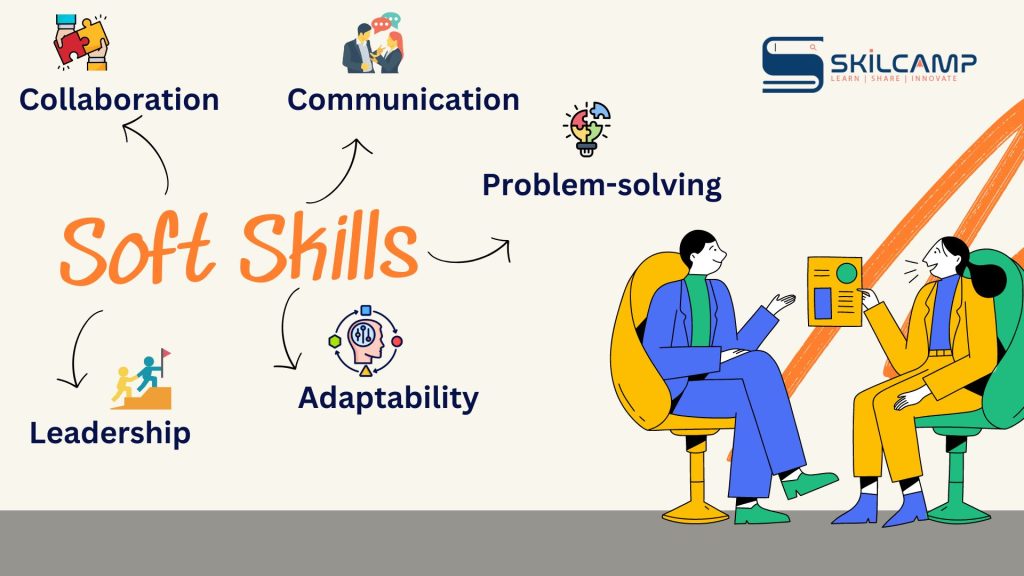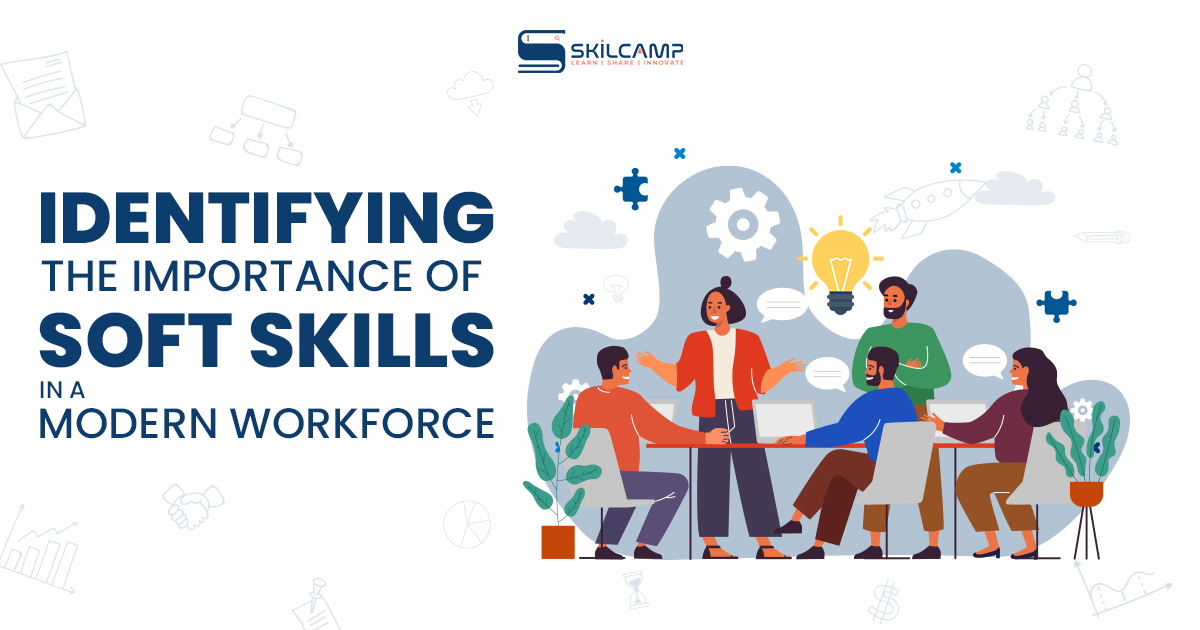Table of Contents
The Vital Role of Soft Skills in Today’s Workforce
Importance of Soft Skills – Interpersonal skills or “soft skills,” are the qualities and habits we bring to our interactions with others. They are particularly the kinds of qualities that companies are looking for since they indicate how well we can collaborate with others on the job.
In contrast to hard skills, which are often associated with particular occupations, soft talents are more closely linked to who we are as individuals and are thus more transferrable. Employers will give you more credit for credentials that show you are willing to work on soft skills, even if, sometimes, they are less concrete than hard talents.
But does it even matter, especially in a digitally driven society?
Soft talents are something only humans can possess. These are the kinds of abilities that AI hasn’t been able to copy, making them invaluable in a rapidly evolving workplace and employment market (AI). Due to this, they will become even more crucial in the years to come.
If you’re considering a job change, it’s in your best interest to brush up on your soft skills by learning the importance of soft skill development course, what they are and how to improve them.

How Soft Skills Help You Grow Professionally?
Soft skills are useful in every professional context, from job hunting to career pivots to professional advancement. Here are some ways to consider the importance of soft skills in professional life:
- Progress in your profession
If you and another applicant both have the same set of hard skills, the hiring manager will choose between you based on criteria other than your level of experience and education. The applicant with the most desirable soft skills will often be the one hired by the hiring manager.
- Essential in today’s and tomorrow’s workplaces
Consequently, a growing number of professions will need interpersonal and communication abilities as a consequence of automation and AI. Due to technological progress, fewer jobs now need technically-oriented expertise, making soft skills a competitive advantage.
Importance of Soft skills in A Modern Workforce
Employees in every division and in every position should work on their interpersonal skills to boost customer satisfaction and cohesion. In addition, you must successfully convince them to make a purchase. But that’s only the beginning when it comes to enhancing the workforce. In this article, we will look at some of the advantages that may be gained by focusing on developing soft skills.
- Boost Productivity in the Office
Overall, employees benefit from increased performance and output when they develop their soft skills. Personnel have better time management skills and improved communication. Thus allowing them to do tasks more quickly without sacrificing quality. The interpersonal skills of team members also play a role in improving the team dynamic, which in turn leads to more effective teamwork.
- Minimize Unwarranted Dangers
The workplace becomes quite dangerous when people lack both self-awareness and confidence. A worker may have trouble interacting with their supervisor or learning new procedures, for instance. As a result, they go against the grain of the company’s policies. In this way, their soft skills aid in risk management and independent problem-solving. They utilize ingenious thinking to consider every angle and outcome.
- Bolster your service to your customers
Customer satisfaction is increased, which is the most obvious result of using soft skills at work. In this way, staff members are better able to understand the customer’s perspective, pinpoint the source of the issue, and provide solutions. Their sensitivity and compassion are also higher than average. This is really helpful when interacting with clients. A consumer rings in to report a concern with a product, for instance. Your support staff may benefit greatly from intensive courses in soft skills training.
- Expand Your Work Forces
The benefits of soft skills training extend beyond the front-line customer service staff. Because they are able to work together and value each other’s input, your staff will become a unified force. These abilities strengthen teams and foster a shared sense of purpose. Everyone continues to have a sunny disposition and an optimistic approach to life’s difficulties.
How to go about developing soft skills?
Strengthening your soft skills may help you in many aspects of your life, including your professional life. The following are some suggestions for honing your “soft skills”:
- Allow for criticism to be given and take your first steps towards a course
Further in discussing the importance of soft skills, being receptive to criticism from higher-ups and peers is crucial for developing soft skills. You may learn and grow in your job and your soft skills when you’re receptive to input from others. Your leadership potential, communication skills, teamwork abilities, and time management could all be evaluated. While constant criticism can pull your morale down, it’s never too late to start a course in soft skills. A self-paced course that allows you to learn while you work is the best to start your soft skills journey. A tailored soft skills course will prevent and prepare you to join and succeed at work.
Recommended to read: Personal Development
- Maintain regular contact
One of the most important “soft skills” in the office is the ability to communicate clearly and concisely with coworkers. Even if you have your own set of duties to do without assistance from anyone else in the workplace, you should still make the most of the chances you have to connect with your coworkers. Having frequent conversations can help you hone this “soft” ability. Conversations in person, through email, and in front of an audience all count. Different communication channels need different sets of soft skills, thus it’s necessary to develop a wide range of them.
- Encourage collaboration and cooperation
You may demonstrate to a potential employer that you are adept at working with others by participating in productive cooperation. Collaboration might take place amongst a larger group preparing a presentation, or it could take place between two individuals working side-by-side to finish a joint project.
Allow everyone in the group to pitch in and shine during a shared job or daily obligation, and take pride in the many talents and perspectives represented there. If you put an emphasis on cooperation, you may pick up useful tips from your coworkers while expanding your own knowledge.
- Create supportive connections
Relationships with coworkers and superiors are essential to many soft skills you’ll utilize on the job. Conversations about the weekend, family, hobbies, and interests may help you connect with coworkers on a deeper level and foster excellent working connections. Explore the possibility of establishing a rapport by discussing something in common. You may ask your coworkers in the department whether they’re interested in having Friday lunch together.
Taking them out of their normal working environment is a great method to build rapport with them. Knowing their character and how it affects their work ethic can only help you in the long run.
The growing demand for soft skills in India will amaze you
Despite the fact that a strong set of the importance of soft skills has always been valued in the workplace, the current epidemic has forced organizations to rethink what it means to have a team with both technical and interpersonal expertise. Businesses and startups are in a fast-paced expansion phase when finding and retaining top personnel are essential because of the slowness caused by the epidemic.
Research shows that between April 2020 and April 2022, demand for people with a growth mentality increased by 194%. The capacity for self-improvement may be thought of as the conviction that any professional can grow their skills by focused effort, that growth is inherent in every endeavour, and that tenacity is essential to success.
Creativity, the second fastest-growing soft talent, has surged by 72% in only the last two years. Being able to apply one’s imagination to an issue at work and come up with novel solutions is an example of workplace creativity.
End Note
In the end, to find long term success and an enhanced work environment one needs to incorporate varied soft-skills into their daily regime. Take your first step towards learning soft skills with a comprehensive course from Skilcamp.
FAQs
- How to develop soft skills?
- Cultivate a spirit of inquiry.
- Prompt introspection is encouraged.
- Learn more and have a better grasp of things.
- Take advantage of cutting-edge LMS programs.
- Give them a chance to get some practice in.
- Give your opinion often.
- What are Soft skills?
Technical abilities are essential for success in every profession, but soft skills, which define how you work and connect with people, are not. They are not the same as “hard skills,” such as data analytics or programming, which can be taught in a classroom. In contrast, they are indicative of your approach to communication, work ethic, and work style.




Leave a Reply